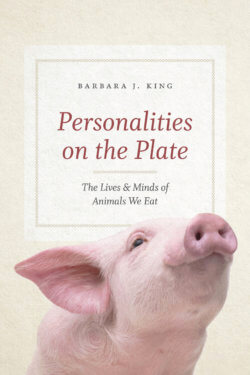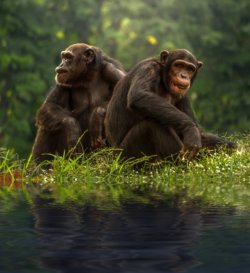If you follow the science of nonhuman animal cognition and emotion, chances are you already know and love Barbara J. King’s work. A contributor to the NPR blog 13.7: Cosmos & Culture, professor emerita of anthropology at the College of William & Mary, author of seven books, and an NhRP supporter, Barbara writes about nonhuman animal lives with clarity and curiosity, merging scientific rigor with heartfelt storytelling. She addresses animal suffering (human-caused and otherwise) but also leaves ample room for joy and hope: both ours (as we learn more about and interact with other species) and members of other species themselves as they go about their daily lives. “To plumb the depths of animal thinking and feeling,” Barbara writes in How Animals Grieve, “means to reassess how we, collectively as a society and individually as persons, treat other animals.” We wholeheartedly agree!
After reading Barbara’s fantastic new book, Personalities on the Plate: The Lives & Minds of Animals We Eat (University of Chicago Press), I talked to her about what drives her writing and advocacy and how she conceives of the present and future as far as animals are concerned:
First, I hope you know that we at the NhRP are big fans of yours! One aspect of your writing we really appreciate is how you emphasize the importance of asking questions about the kinds of beings other animals are—and being open to acknowledging and acting on the answers. In your view, where in this process do most people get “stuck” (if that’s the right word to use) and why?
Thank you so much—the fan status absolutely goes both ways. I was thrilled to watch Unlocking the Cage at Sundance last year, and some months later on was asked to introduce [NhRP President] Steve Wise at one of his amazing university talks (video below). That was an honor.
So, here you ask an important and hard-to-answer question that gets to the heart of transforming the ways nonhuman animals are treated. More and more, I’m thinking about human exceptionalism and how it is that some people so readily settle on thinking of humans as separate, superior, and special. Many of our institutions that take freedom and autonomy away from nonhuman animals not only put our species at the center, but also implicitly suggest that our needs are the only ones to matter—from research laboratories and zoos to our food systems. Culturally, we are steeped in this mindset so much from childhood on, that even for people who connect emotionally with dogs and cats it can feel that there’s a wall between their own lives and the lives of a chimpanzee in a zoo or a pig in a factory farm.
And let’s face it, it does cost us to tear that wall down—because when we feel empathy, and want to change things, we face obstacles and it really hurts emotionally to feel all the animal suffering in the world. At the same time, there’s such joy when we make a positive difference in animals’ lives, and I do see genuine transformation happening. I think the answer is related to turning on the minds and hearts of younger people, from childhood on—helping them make that perspective shift to a place where they understand that so many nonhuman animals too think, feel, and want to live without human-induced suffering.
In your articles and books, you move seamlessly between and make clear that you value both scientific evidence and human experience of nonhuman animals’ cognitive and emotional complexity. I wondered how you see the Internet figuring in the dissemination of these two forms of knowledge. In what ways do mainstream online publications and social media in particular help “restore animals to our visibility,” to paraphrase a sentence from the latter book? In what ways don’t they?
 You’re right, in my writing I weave together science in the form of material from peer-reviewed scientific publications with case studies, carefully reported observation from those who know specific animals well. The result is science-based storytelling that I believe can be really effective! I’m a Twitter addict (@bjkingape) and I do believe that social media is a fabulous tool for connecting people with nonhuman animals as thinking, feeling individuals. But as with everything, this has to be done thoughtfully. When I tweet about an animal, I try in so far as possible to name him or her, to raise points or questions about his or her life—for instance April the giraffe who galvanized millions via the livestream feed of her labor and delivery. When I wrote about her at NPR and then tweeted, I asked people to remember that she is confined to a zoo and that by the zoo’s own admission, her baby will be sent to a separate facility at weaning, for breeding. There’s a tendency for the mainstream media to go heavy on the “cute”—on stories of this or that cute animal, without exploring or acknowledging the individual being involved, or the conditions in which the animals live. On the other hand, I learn a tremendous amount from the online community I belong to, of other scientists, writers and animal activists, who collectively inspire and teach me new things every single day, and we just need to keep pushing that inspiration and education outward to reach new people.
You’re right, in my writing I weave together science in the form of material from peer-reviewed scientific publications with case studies, carefully reported observation from those who know specific animals well. The result is science-based storytelling that I believe can be really effective! I’m a Twitter addict (@bjkingape) and I do believe that social media is a fabulous tool for connecting people with nonhuman animals as thinking, feeling individuals. But as with everything, this has to be done thoughtfully. When I tweet about an animal, I try in so far as possible to name him or her, to raise points or questions about his or her life—for instance April the giraffe who galvanized millions via the livestream feed of her labor and delivery. When I wrote about her at NPR and then tweeted, I asked people to remember that she is confined to a zoo and that by the zoo’s own admission, her baby will be sent to a separate facility at weaning, for breeding. There’s a tendency for the mainstream media to go heavy on the “cute”—on stories of this or that cute animal, without exploring or acknowledging the individual being involved, or the conditions in which the animals live. On the other hand, I learn a tremendous amount from the online community I belong to, of other scientists, writers and animal activists, who collectively inspire and teach me new things every single day, and we just need to keep pushing that inspiration and education outward to reach new people.
So far in our litigation, no court has challenged the idea that chimpanzees are self-aware, autonomous beings; a New York appellate court judge even called the NhRP’s affidavits from scientists “very impressive.” And yet, all the same, our chimpanzee clients remain legal “things” with no rights even though science and law suggest they should be recognized as legal “persons” with fundamental rights. How might you account for this gap between the science of animal cognition and emotion and animals’ legal status? Why do you think the law is still lagging behind the science as far as animals are concerned?
 The idea of animals as property or as things is so deeply entrenched in Western systems of law; it’s hard to shake that loose from what years of animal-behavior, anthropology, and psychology studies tell us about chimpanzees as able to reason, remember, plan, suffer, and take into account factors that affect their own well-being.
The idea of animals as property or as things is so deeply entrenched in Western systems of law; it’s hard to shake that loose from what years of animal-behavior, anthropology, and psychology studies tell us about chimpanzees as able to reason, remember, plan, suffer, and take into account factors that affect their own well-being.
In thinking about the “why,” I remember Steve talking so movingly about this: we know about the not-so-distant past in which human beings other than white men were considered as property or less-than-human in our legal systems. As an anthropologist I think that the human trajectory has been bound up with a tendency to fear what happens when “the other” (as groups in power would construct it) gains rights. I’m not saying that inequality is biologically determined, instead just the opposite: that it is culturally constructed, it happens because the “what if” clause takes root in people’s brains: what if “they” were accorded legal rights, what would I lose?
Of course, I’d turn that question on its head. I would ask what we all would gain if chimpanzees became legal persons. From the perspective of ethics, empathy, and doing the right thing for smart feeling primates who can’t on their own ask for their day in court, we would gain a lot.
One of my favorite lines from Personalities on the Plate is in the afterword: “We owe it to all of these animals to become aware of their sentience and to use our intelligence to acknowledge and act on behalf of theirs.” On what scale do you hope to see this happening in the coming months and years, and what kind of action do you envision?
As you know, I’ve focused in my work both on a consideration of how nonhuman animals love and grieve, and now more recently on asking how octopuses, fish, chickens, goats, cows and pigs came to be seen narrowly as “food animals” when the science shows their quite notable abilities of cognition and emotion. On a personal level, I have two major goals right now. First is to join with other activists who have been working relentlessly for years to urge people to eat fewer or no animal products in order to reduce animal suffering and to aid environmental activism; I’m writing and speaking out on this from the perspective of the science that I do, wherever I can. Second, I want to continue to advocate for monkeys and apes held in invasive research labs, terrible zoos, and private homes, because nonhuman primates were and are my first love in the animal world.
On a larger scale, I see all of us together really pushing the boundaries in the years to come: cetaceans held in theme parks released to sea pens, monkeys in labs retired to funded sanctuaries, questions about even the possibility of there being humane meat brought into the open as plant proteins and new (animal-less) sources of meat come into the fore. It’s all of us working together from all these different angles that will make the impact.

Thank you for taking the time to answer these questions, Barbara! To learn more about Personalities on the Plate: The Lives & Minds of Animals We Eat, visit this page. Follow Barbara J. King on Twitter at @bjkingape.